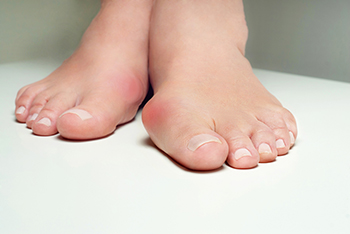

Bunions are a common foot deformity that can affect both men and women, although they are more prevalent in women who wear narrow-toed shoes. This condition involves the displacement of the joint connecting the big toe and the first metatarsal bone, causing the joint to protrude on the inner side of the foot and the big toe to deviate toward the smaller toes. Several factors contribute to the development of bunions. Genetics may play a role, as there can be a family tendency for this deformity. Abnormal foot mechanics, such as overpronation, where the foot flattens excessively and turns outward during walking, can contribute to bunion formation. Wearing tight, high-heeled shoes can worsen the condition, leading to pain due to shoe pressure and altered weight distribution. Treatment options may include medication for pain relief, protective measures to reduce pressure on the area, and orthotic devices to correct abnormal gait and prevent further deformity. In cases where deformity is severe and conservative treatments are ineffective, surgical intervention may be necessary. If you have a bunion and it is causing discomfort, it is suggested that you make an appointment with a podiatrist who can examine your foot and recommend the most suitable treatment plan.
If you are suffering from bunion pain, contact Dr. Nooshin Zolfaghari of VIP Foot & Ankle Center. Our doctor can provide the care you need to keep you pain-free and on your feet.
What Is a Bunion?
Bunions are painful bony bumps that usually develop on the inside of the foot at the joint of the big toe. As the deformity increases over time, it may become painful to walk and wear shoes. Women are more likely to exacerbate existing bunions since they often wear tight, narrow shoes that shift their toes together. Bunion pain can be relieved by wearing wider shoes with enough room for the toes.
Causes
Symptoms
In order to diagnose your bunion, your podiatrist may ask about your medical history, symptoms, and general health. Your doctor might also order an x-ray to take a closer look at your feet. Nonsurgical treatment options include orthotics, padding, icing, changes in footwear, and medication. If nonsurgical treatments don’t alleviate your bunion pain, surgery may be necessary.
If you have any questions, please feel free to contact our office located in Pembroke Pines, FL . We offer the newest diagnostic and treatment technologies for all your foot care needs.